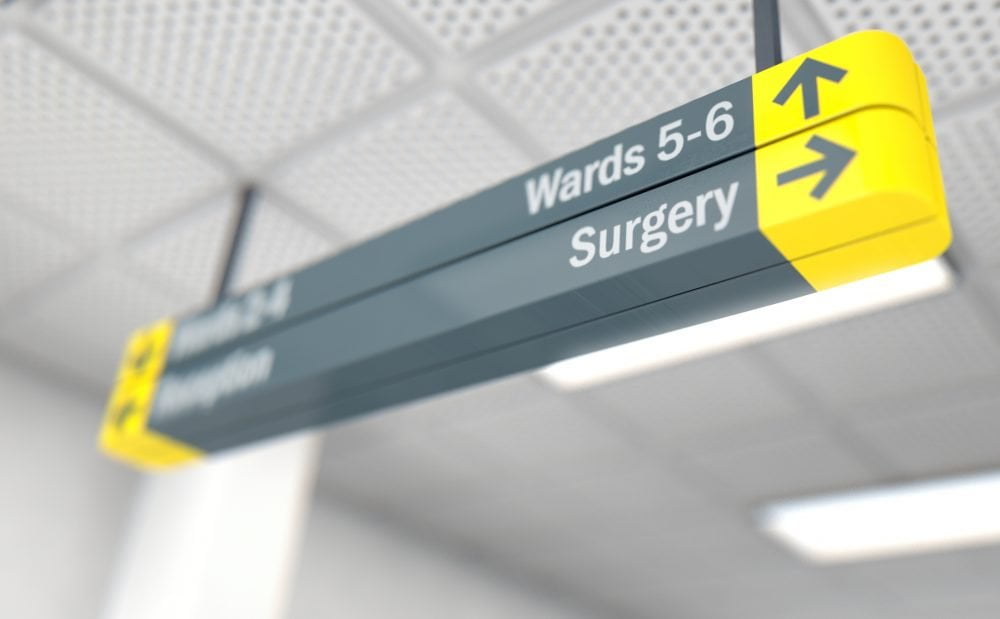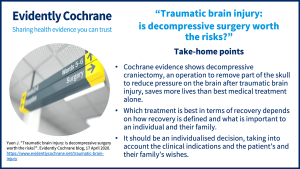In this blog for patients who have had a traumatic brain injury where the pressure inside the skull is not controlled by medications, and their relatives, Jason Yuen, Neurosurgical Registrar in South West England, looks at the latest Cochrane evidenceCochrane Reviews are systematic reviews. In systematic reviews we search for and summarize studies that answer a specific research question (e.g. is paracetamol effective and safe for treating back pain?). The studies are identified, assessed, and summarized by using a systematic and predefined approach. They inform recommendations for healthcare and research. on a surgical treatmentSomething done with the aim of improving health or relieving suffering. For example, medicines, surgery, psychological and physical therapies, diet and exercise changes. and discusses the benefits and risks.
Page last checked 26 June 2023
Take-home points
Traumatic brain injury can be classified into mild, moderate or severe, and is injury to the brain due to trauma which may be caused by a fall or a road traffic accident [1]. While those with a mild traumatic brain injury often make a good recovery, the others sometimes become very ill, requiring support from the intensive care unit. One of the most feared consequences with brain injury is the increase in pressure inside the skull (known as the intracranial pressure). The skull is relatively rigid, therefore with complications such as brain swelling or blood clot, the pressure can suddenly go up rapidly when the brain can no longer cope with its normal compensatory mechanism.
When this happens, the first thing to be done would not normally be surgery. Rather, the person might be given medicines to sedate them, and occasionally lowering the body temperature to help to reduce the pressure or draining some of the brain fluid. However, when the pressure does not come down (which may lead to brain cell death), as a last resort, it may be necessary to remove part of the skull to give room for the brain to expand and therefore the surviving brain cells a chance to recover. This operation is called “decompressive craniectomy”.
Is surgery always better than doing nothing?
Those who have read Henry Marsh’s best-seller, Do No Harm [2], will have got a glimpse into the everyday ethical dilemmas a neurosurgeon may need to face. One of the hardest decisions they have to make in an acutely unwell patient (such as someone with a severe brain injury) is whether or not to admit the patient for an operation. Very often, a patient may have a reduced level of consciousness and therefore lacks capacity to make their own decision and the clinicians would just need to “do the right thing”. However, surgery clearly has its limitations and should not be the solution to every problem. One of the other key principles in medical ethics is non-maleficence (“do no harm”). All surgeries come with risks and hence, the surgeon would need to weigh what is in the patient’s best interest.
What factors need to be taken into account?
The patient’s wishes are obviously among the top of the list but if they have not expressed any requests prior to their injury, how do we know (perhaps it is time for all of us to tell our next of kin what we would want or write an advanced directive)? How about the family’s wishes? But they are not the one who may need to live a disabled life for the next forty years and might opt for surgery out of guilt, as they might feel if they decided to withdraw treatment, it would be a betrayal to their loved one. Ultimately, it is a medical decision, legally. The severity of the injury is important as well, as surgery may be futile or confer a longer survival but with severe disability.
The patient’s pre-existing quality of life should also be considered. A frail person who is normally wheelchair bound with severe dementia is unlikely to be having a great quality of life even if they survive a severe brain injury. Age is an important factor but should not be the sole determining factor (younger brains do tend to recover better).
Undertaking a decompressive craniectomy may lead to a number of different outcomesOutcomes are measures of health (for example quality of life, pain, blood sugar levels) that can be used to assess the effectiveness and safety of a treatment or other intervention (for example a drug, surgery, or exercise). In research, the outcomes considered most important are ‘primary outcomes’ and those considered less important are ‘secondary outcomes’.. In order to inform the family appropriately and do what is best for the patient in a shared decision-making process, we need an evidence-based approach.
Evidence on surgery vs medical treatment after traumatic brain injury
A Cochrane ReviewCochrane Reviews are systematic reviews. In systematic reviews we search for and summarize studies that answer a specific research question (e.g. is paracetamol effective and safe for treating back pain?). The studies are identified, assessed, and summarized by using a systematic and predefined approach. They inform recommendations for healthcare and research.[3] published in December 2019 has brought together all the evidence from relevant research looking at decompressive craniectomy for the treatment of high intracranial pressure in closed traumatic brain injury. There were just three studies to include, involving 590 children and adults.
The overall conclusions from the review authors are that “decompressive craniectomy holds promise of reduced mortalitydeath, but the effects of long-term neurological outcome remain controversial, and involve an examination of the priorities of participants and their families.” Let’s have a look at what this means.
Risk of death
At 12 months, more patients who had the surgery survived compared with those who had medical treatment only. However, a proportion of these might have fairly severe disability, although one needs to bear in mind that a “bad” outcome for one may not be so bad for another person.
What level of recovery?
The review authors found that, at 6 months, there may be little or no difference between surgery and medical treatment in terms of the likelihood of recovering well or with minor disability versus dying, being in a vegetative state or left with severe disability. The review authors are confident that, at 12 months, there is little or no difference between these treatments for these recovery outcomes, as shown by high-certaintyThe certainty (or quality) of evidence is the extent to which we can be confident that what the research tells us about a particular treatment effect is likely to be accurate. Concerns about factors such as bias can reduce the certainty of the evidence. Evidence may be of high certainty; moderate certainty; low certainty or very-low certainty. Cochrane has adopted the GRADE approach (Grading of Recommendations Assessment, Development and Evaluation) for assessing certainty (or quality) of evidence. Find out more here: https://training.cochrane.org/grade-approach evidence from one studyAn investigation of a healthcare problem. There are different types of studies used to answer research questions, for example randomised controlled trials or observational studies..
When the treatments are compared for their effects on the likelihood of death or being in a vegetative state versus other levels of recovery (including moderate and severe disability), one study shows that at 12 months the riskA way of expressing the chance of an event taking place, expressed as the number of events divided by the total number of observations or people. It can be stated as ‘the chance of falling were one in four’ (1/4 = 25%). This measure is good no matter the incidence of events i.e. common or infrequent. of death or vegetative state is reduced by surgery compared with medical management. It is important to bear in mind what “moderate disability” may mean for different people.
Limitations of the evidence
This review has summarised the best evidence we have so far. However, there are a few limitations to the studies involved. The number of participants, especially in the two smaller studies is very small. None of the studies involved were “blindedBlinding is the process of preventing those involved in a trial from knowing to which comparison group a particular participant belongs.”[4], as it would be very difficult to perform sham surgery (i.e. just making a cut on the scalp but not taking out the bone) on a critically unwell patient (also with a craniectomy surgery, the scalp would eventually sink in from the outside so the patient would know what interventionA treatment, procedure or programme of health care that has the potential to change the course of events of a healthcare condition. Examples include a drug, surgery, exercise or counselling. they have had).
The other limitation from the Review is that all these patients would need a monitor of some sort inserted into the skull to measure the intracranial pressure in order to make a decision regarding decompressive craniectomy. This procedure itself also carries risks.
Making decisions with your relative’s doctors
For relatives communicating with the health professionals engaged in the care of patients with severe head injury who may need a decompressive craniectomy, the key questions to put to the doctors include:
- What is the likely outcome if this is not performed?
- What is the likely outcome if this is performed?
- What are the other options?
But also, be prepared to answer the following questions:
- What was the patient’s quality of life before the injury?
- What would the patient want as far as you know?

It is understandable that this would be a situation none of us wants to find ourselves in. The decision would be very difficult and the clinicians caring for your loved one would want to reach the best decision, taking into account what you feel the patient would want. Knowing about the evidence and thinking about these questions would be helpful to make the call when the time comes.
Join in the conversation on Twitter with @JasonYuenNeuro @CochraneUK or leave a comment on the blog. Please note, we will not publish comments that link to commercial sites or appear to endorse commercial products.




Dear Doctor, what are ur directions for a84 adult after a decompressive craniectomy surgery caused head injury for a speedy recovery? Thank you
Dear Hassan, I’m afraid we can’t give clinical advice here, so I hope your doctors can be helpful.
Best wishes,
Sarah Chapman [Editor]